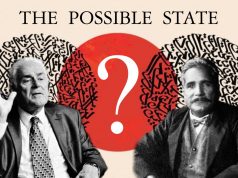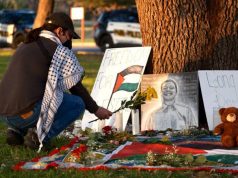A writer for the Antimedia once said ‘Propaganda is the wheel by which the government steers the bus of a Nation’. With the mainstream media doing the dirty job, public opinion is altered, misled and deviated. One will find fewer voices of truth, of stories that need to be told and pictures that need to be shown to reorient the misinformed public opinion. It’s strange how certain people/nations are stereotyped and always spoken of with displeasure, extolling all else that lies outside the sphere of anything close to good, while others are always portrayed as celebrated compatriots and saviors. Saudi Arabia is one such country that eternally finds itself in the soup.
With the arrest and punishment meted out to the former blogger, Raif Badawi, the Kingdom is again the cynosure of all eyes. If some call its decision a travesty of freedom of expression, an act of barbarism and religious intolerance, others spew headlines comparing it to ISIS for its cruel ‘flogging’, while still other ‘opportunists’ pass infelicitous remarks on the very theme of religion. Hurling epithets at the monarchy and calling it a fount of ‘all things medieval’, they say Badawi is just ‘one’ of the many Saudi liberals who have been accused, arrested and maybe even executed for ‘free thought’. However, the Kingdom of Saudi Arabia is not alone in the matter.
Injustice
For a country to covet its power and be averse to its ‘free thinkers’ and its discreet ways to defend the same is not news. If the land of the not-so-free considers insulting its religious laws, which are clearly ‘a part’ of its constitution, an act of treason, so does any other country. Take for instance, Obama’s administration in the case of its whistleblowers for flouting the Espionage Act. If Badawi is a threat to the government in the peninsula, so is Snowden in the eyes of Obama, who refused to pardon him irrespective of the increasing international support that he has gained. Both are hailed as ‘heroes’ for their ‘moral courage’ and ‘civic duty’. If the Kingdom has done injustice in the garb of its religious laws, so has America in the garb of its constitutional laws, making both equally ‘harsh’ in their stance if not less. And Snowden is just ‘one’ of the whistleblowers Obama has dealt with. One may weigh ‘blogging’ as a lesser crime (or no crime at all) than leaking information, but Obama’s ‘war on whistleblowers’ runs deeper. David Carr in his article ‘Blurred Line Between Espionage and Truth’ for the New York Times proves that there is more to the picture than what meets the eye. While it may ‘laud’ brave journalists for reporting from distant lands, it holds its own ‘aggressive’ stance when it comes to its whistle blowers.
Other instances like the arrest and torture of Aafia Siddiqui, or the massacre of the brotherhood by the El-sisi in Egypt, or that by Israel of the Palestinians, or even communal riots tantamount to genocide in India, Myanmar or Bangladesh, are all barbaric in one form or the other.
If Jack Tapper finds in it an attempt to hinder aggressive journalism, Carr finds reason enough for the ‘double standards’- “that the administration seems to believe ‘the truth should come out abroad; it shouldn’t come out here.” More revealing is the fact that majority of the recent criminal charges under the Espionage Act ‘have everything to do with administrative secrecy and very little to do with national security’. For instance, take the case of John Kiriakou, who leaked information of CIA officers’ ‘inhuman’ interrogation techniques, or the case of Thomas A Drake for pinning his opinion on a better intelligence gathering software program that aimed at protecting the privacy of US individuals, as should be the case rather than exploiting it.
If these sound milder than Badawi’s case, then lets remember Bradley Manning, another whistleblower, who has been ‘held in confinement since May 29, 2010’, ‘subjected to illegal punishment and torture for nine months at Quantico marine base’ and ‘imprisoned for over three years before trial’. His crime? Revealing some of the dirtiest secrets of America to the public- ‘torture, illegal surveillance, and corruption’– not to forget the video ‘collateral murder’ released by Manning showing the unprovoked slaying of two Reuters journalists, and documents covering deliberate civilian killings by US forces in Iraq and Afghanistan, thousands of civilian casualties never acknowledged publicly, and innocence of most Guantanamo detainees.
Dig a little deeper on the many number of whistleblowers, and one will come across Diane Roark who, despite seeking ‘lawful’ means to raise her voice on domestic spying, found herself in the middle of an FBI raid. James Risen, New York Times reporter, having been dogged for seven years by the federal law for different reasons, calls her case, ‘a classic example of why Snowden had to do what he did’. He calls Obama ‘the greatest enemy of press freedom‘ and that ‘the one thing the government doesn’t want to see is more aggressive investigative reporting.’
Why exhaust one’s breath over the US? Because it assigns to itself a duty to defend ‘freedom and liberty and people’s rights’ like no other in the world. If Egyptians are tormented under a heavy censorship of the press under Sisi’s military regime for security reasons, even if its just reporting peaceful protests, so are the many untold number of journalists in Palestine. In either areas of strife and conflict, they are subjected to unwarranted arrests, harassment and conviction, with all possible govt measures used to silence them. China proves to be most stringent in its restrictions to the press, including censorship of websites (Facebook, Gmail, Google, YouTube, Twitter, Instagram etc), promotion of the party’s interests through TV, radio and films in every way possible manner and even re-writing articles in certain cases. If the Chinese government likes to control its citizens’ freedom of speech with halters, it makes the case worse in conflict areas, where injustice is at its pinnacle and the voices of the truth seekers nipped, making it even more difficult to know the exact number of bloggers or journalists behind bars or even put to execution.
The point is, if one strangles its citizens overtly through ‘harsh’ laws, the other does it covertly through other laws and policies that it deems fit for its public and for its supposed concern for ‘national security’. Justifying the latter in any manner is a spoof of justice as much as it is in the case of the former.
Barbarism
Many human rights activists held placards in front of the Saudi embassies or on the streets, some with slogans like ‘It is not 1715’, condemning the flogging of the blogger. Because we have stepped into an age of man’s most advanced stage of humanity and intellect, the Kingdom’s archaic punishments seem to be as outmoded as ever. But our celebrated advancements have not reduced crime as such. So we authorise more ‘humane’ ways of detention, interrogations and punishments, all lying within the bounds of ‘international law’.
2012 marked the 10th anniversary of the Guantanamo Bay, a US detention camp established to detain some of ‘the most dangerous men’ the world has ever known. The Justice Campaign lists out the ‘authorised’ torture techniques under more than 11 subheads, which include sleep deprivation for as long as 72 hours, and up to 50 days under ‘operation sandman’, solitary confinement (outlawed under Geneva conventions) for years, mock executions, forced medication that cause ‘neuropsychiatric effects’ including ‘suicidal thoughts, behaviours, and psychosis’, use of temperature extremes- cold cells and sweatboxes, sensory bombardment (noise), watching others being tortured and other psychological and ‘enhanced’ interrogation techniques. Use of unauthorised ‘cages’ and ‘fetters’, ‘sexual assault/humiliation techniques’ including sodomy with broomsticks and rifles, forced undressing, naked parade, rapes, masturbation by interrogators and guards have been reported by released detainees.
An American Civil Liberties Union (ACLU) infographic ‘Guantanamo- By the Numbers’ shows revealing statistics. A total of 779 were imprisoned (116 remaining as of 2015), including 21 children, the youngest being 13, one of them dead at 21. The details of their lives go beyond the realms of barbarism. What makes it worse is that most detainees are innocent, with a mountain of evidence of ‘illegal detention’ as claimed by Lawrence Wilkerson, an ex-Bush era official. More alarming is that ‘indefinite detention’ is lawful under America’s military policy for ‘terror suspects’ who are caught mostly on ‘reasonable suspicion’ which is a ‘loose standard because it requires neither ‘concrete evidence’ nor ‘irrefutable evidence’, as criticised by Arjun Sethi in The Guardian. He says, ‘this vague criterion is now being used to label innocent people as terrorism suspects.’ With NSA’s ever growing ‘terrorist watchlist’, India and UK don’t seem to be alone in their idea of arresting citizens for ‘liking’ posts or comments on the web.
The Kingdom may be denounced for its corporal punishment, but our modern laws make sure the prisoners, whose crimes have not yet been proven, have worse treatment than any form of ‘barbaric’ physical punishment.
Some may refer to efforts being made by the administration to ‘safely’ close down GTMO but the pace at which this is happening makes it an effete attempt. GTMO is just ‘one’ of the known torture camps in addition to many more secret ones around the globe. Other countries are not far behind America. Google ‘illegal detention’ and one will find possibly every country popping up for one reason or the other including India, Srilanka, Philippines, Russia, China, Myanmar, Bangladesh and so on and so forth. The Kingdom may be denounced for its corporal punishment, but our modern laws make sure the prisoners, whose crimes have not yet been proven, have worse treatment than any form of ‘barbaric’ physical punishment.
Other instances like the arrest and torture of Aafia Siddiqui, or the massacre of the brotherhood by the El-sisi in Egypt, or that by Israel of the Palestinians, or even communal riots tantamount to genocide in India, Myanmar or Bangladesh, are all barbaric in one form or the other. The respective governments may repudiate blame and disown responsibility, but it in no way effaces the truth from the minds of affected civilians, the accounts of the truth-seeking journalists and survivors, and the criminal records of government officials.
Gory executions or ‘hanging’ maybe unethical in many ways but the more ‘ethical’ lethal injection does not really give the convict a comfy death. ‘Americans may shudder at the barbarity depicted in videos showing public executions by the govt of Iran, Saudi Arabia and China. But the fact remains that alone among all western countries, the United States is a death penalty country,’ says Anthony L. Fisher in his article for newsweek, ‘Americas Secret Prison Executions‘. It is far from any ethical ‘medical procedure’ where the drugs used are ‘experimental, untested’ and ‘ineffective at killing prisoners without excruciating pain.’ If most of the public is not aware of the ‘illusory civility of lethal injection’ it’s because of the government’s ‘continued efforts to shield the public from the reality’.
Intransigence
The Kingdom has often been blamed for religious intolerance, for using hateful terms- ‘infidels’- for non-Muslims and foreigners and for not allowing other places of worship to be built on its soil. This apparently makes it inferior to the more secular and democratic countries in the world. If one were to really research the theme of hatemongering in recent times, one will find that it comes more so from unexpected quarters. The seminary of hate post 9/11 was created in secular countries. While Arab countries were lambasted for harbouring terrorist groups, the American government failed miserably in halting the hate-filled messages doing the rounds on TV and radio. While some parroted what the administration spilled out for them after the attack, others harped maliciously on incendiary remarks and comments, branding anyone with a beard and a Muslim name as ‘terrorist’ for a crime that has more evidence of an inside job than of Al-Qaeda. If the govt did not directly help spread the message of Islamophobia, the very use of misnomers like ‘Islamic’ or ‘Muslim’ with any belligerent act in the newspapers, local and national, did the job.
In recent times, Islamophobes who wished to display hate-filled posters in public places or give similar talks in colleges, universities and even TV shows were given the heads up by federal law on the basis that their messages did not ‘incite violence’. But to say they intend to incite violence is naive. They have more discreet motives- to disinform the public. Stereotyping Arabs, portraying Muslims as hostile and often as terrorists in the entertainment media plays a role too as Melissa Boigon asserts in her Ted talk. ‘Its not the religion that creates terrorists, its the politics’ by Giles Fraser in The Guardian is another noteworthy article which hints at the West’s ‘role in helping create it’.
If laws permitting places of worship have been passed, so have laws for restricting their construction and allowing demolition. If Italy passed ‘anti-mosque’ laws, so did the republic of Angola with headlines ‘bans Islam, will demolish all mosques’. The headlines are not as revolting as the comments that follow, fraught with anti-Muslim bigotry. If Babri masjid is a controversial issue of demolition in India, so are the many mosques and churches often vandalised in riots and communal upheavals.
The Kingdom may still seem hostile towards its minorities but are they subjected to any national ‘anti-non-Muslim’ propaganda with bigoted literature, media and films to back them as in the West? Are they subjected to criticism, defamation and hatemongering in the name of freedom of speech?
The Kingdom may still seem hostile towards its minorities but are they subjected to any national ‘anti-non-Muslim’ propaganda with bigoted literature, media and films to back them as in the West? Are they subjected to criticism, defamation and hatemongering in the name of freedom of speech? Are their religious figures caricatured and ridiculed? Are they coerced from practicing their beliefs and rituals as in France and China? Are they massacred for being ‘infidels’, or subjected to communal riots and consequent distrust as in India? Are they treated as an ‘unwanted people’ and left adrift on sea as the Rohingya? Are they refrained from living decent lives, or do the government officials keep suggesting forced conversions and sterilisation to limit their population for being infidels? None of the above can be answered in the affirmative. Secular countries have been more averse to religion than any other.
So, what really makes Saudi Arabia different?
The fact that it is a Muslim country and follows ‘Islamic’ principles, even if distorted to an extent, more reverently than most. The very notion of ‘Islam’ and the ‘state laws’ being interconnected draws out the fangs in most liberals. ‘Violation of freedom of expression’ is just a game phrase often used, misused and clamored by people, governments and the media for their own vested interests. Freedom of expression has been violated more number of times and with even more severity than the press has ever mentioned or a government has ever stood up in condemnation and if it is ever spoken of, it is only so when ‘religion’ is in the fray, which makes it more parallel to ‘freedom of Athiesm and Islamophobia’ for the majority. Unjust policies have done more harm to people than just stripping them of the freedom to express. If the world unites so often against its violation, so should it unite with every violation of any law, be it in the face of religion, humanity, a more appealing government or not. If ‘they’ have unreasonable laws and commit inhuman acts, ‘we’ despite having reasonable laws commit similar crimes by authorising or circumventing them.
If Raif Badawi is a Prisoner of Conscience with a distraught family waiting for his return, so are the many others behind bars in Egypt and Palestine and other countries with various degrees of media censorship. If outmoded laws have made the Kingdom of Saudi Arabia ‘barbaric and unjust’ so have our modern laws in one form or the other, which makes the Kingdom just another government no less than others, if not worse.






